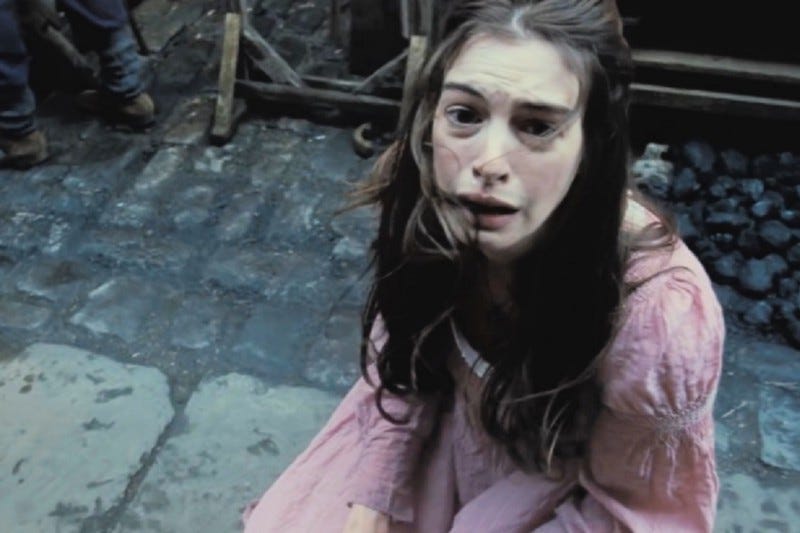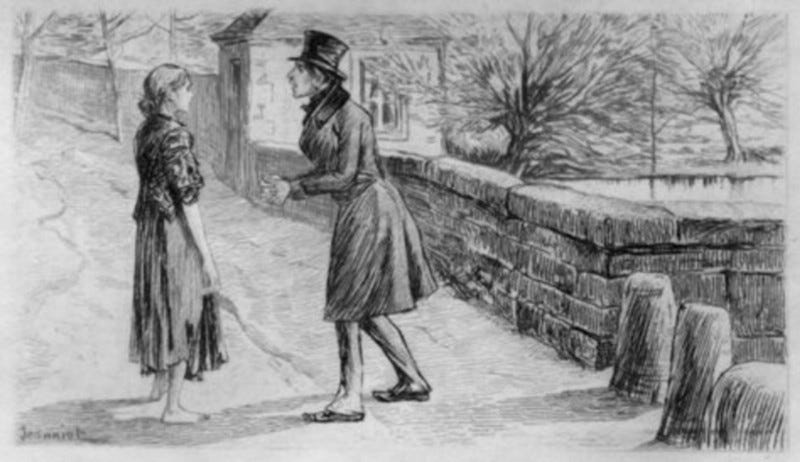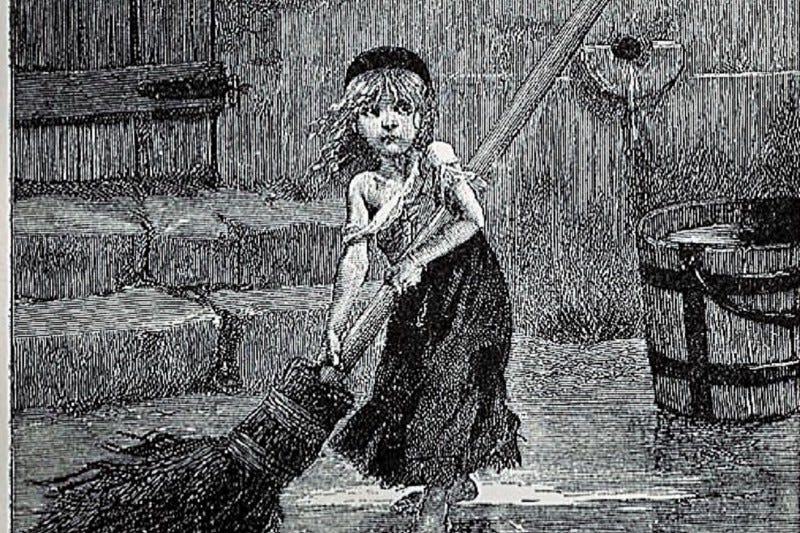The Touching Back Story You Didn't Know About Fantine And Les Misérables
When Victor Hugo died at 83, despite that he’d asked for a pauper’s burial, two million people showed up for his funeral.

On a freezing cold day in February, 1829, Victor Hugo watched a man in rags being dragged away by police for stealing a loaf of bread to feed his starving family.
He wasn’t watching the man, except peripherally.
As the police dragged the struggling man away, Hugo was watching the mother and child hiding in the shadows, the mother quietly distracting her child. Both dressed in rags unfit for winter.
I can almost see it, can’t you? A young woman, fear and hunger clawing in her belly, trying to shush her child and hold back her own tears as her husband is dragged away. All because they were too hungry.
He’d get hard labor, that man. 5 years at least, maybe more.
While he was locked away, he would know, every minute of every day, what would be happening to his wife out there. Alone. On the streets. Without a man to care for her or provide for her.
Hugo knew, too.
But the tigers come at night…
When we meet Fantine in Les Misérables, she’s a beautiful young woman working exhausting hours in a factory for too little pay while enduring the wandering hands of a boss that takes liberties because he can.
Fantine loses her job when the foreman learns she’s unmarried with a child. She tells him the father abandoned them. She needs the pay. She’s paying the innkeeper to care for her daughter while she works.
Her daughter is sick, she tells him. She needs her job to pay a doctor so her little girl doesn’t die. She is begging and pleading to keep her job, but he grabs her by the shoulders and bodily throws her into the street.
Go, harlot! Don’t need your kind of trouble here.
Out on the streets, Fantine quickly learns that begging won’t save her child. The poor don’t have money and the rich don’t care. You for sale, sweetheart? How much. Men reaching, grabbing, groping.
She sells her hair and teeth first.
Beautiful long hair, shorn off to the head. Teeth yanked out by a back alley butcher without any freezing.
In the movie, they show Fantine selling her molars but that’s a limitation of movie making. In reality, women sold any teeth that didn’t have cavities. Front teeth were the most popular.
Finally, Fantine is forced to sell the only thing she has left. Her body. She becomes a prostitute. It’s the last option a lot of women had, if they didn’t have a man to provide for them.
If she didn’t sell her body, her child would become homeless, too. She would do anything to prevent that. A little girl on the streets? No.
In the movie, you watch as Fantine gets thinner and thinner, and begins to move furtively like the frightened animal she becomes.
No spoilers, I won’t tell you the rest.
I cried through most of the movie.
With their voices soft as thunder…

Some people say writing is seeing and for Victor Hugo, that was absolutely true. He was a people watcher who wrote everything in his journals. Every day, he’d go home and pour his soul into journal after journal.
In 1841, he saved a prostitute from arrest and wrote about it.
He watched a young man walk up to the woman and shove snow down her dress. A dandy, he wrote in his notebook, well-to-do. Stylishly dressed. She screamed in shock and slapped him.
So he hit her. She hit back. It escalated quickly, the woman fighting back as the dandy beat her. When police came running, the man yelled assault. The police were arresting her when Hugo intervened. He saved her.
If you’ve watched Les Misérables, that scene is in the movie.
One day, Hugo watched an ex-convict, Eugène François Vidocq, use brute strength and adrenaline to lift a cart off a factory worker who was trapped underneath. Saved the man’s life. That’s in Les Misérables, too.
Over 1000 pages of observations that would be published after his death. In French, his note books were called “Choses Vues.”
In English, it means “Things Seen.”
As they tear your hope apart…

When Victor Hugo published Les Misérables in 1862, it was one of the longest novels ever written. 655,478 words, written in French.
It was a protest against the inhumanities humans inflict on each other. A book for everyone who felt oppressed.
“I don’t know whether it will be read by everyone, but it is meant for everyone… Social problems go beyond frontiers. Humankind’s wounds, those huge sores that litter the world, do not stop at the blue and red lines drawn on maps. Wherever men go in ignorance or despair, wherever women sell themselves for bread, wherever children lack a book to learn from or a warm hearth, Les Misérables knocks at the door and says: “open up, I am here for you”. — Victor Hugo
Every scene in the book came from his journals.
He wrote what he saw. Choses Vues. Things seen.
It was never fiction.
Most of Hugo’s journals were never translated to English, but among the few translated, there’s an entire chapter titled “Origin of Fantine.”
The man stealing bread was the inspiration for Jean Valjean. After the book came out, Hugo said as he watched that man, he was barely able to see the man. That man became “the specter of la misère.” The picture of poverty.
It gave him the title for his book.
The Catholic church banned his book and it was banned until 1959. They didn’t approve of him speaking about prostitution. Bad morals, you know.
By 1904, it was banned from a Philadelphia school, too.
I had a dream my life would be, so different from this hell I’m living…

Three days before Victor Hugo died, battling pneumonia he picked up a quill and wrote the last entry in his journal.
Aimer, c’est agir.
To love is to act.
He had done that, indeed. Thousands upon thousands of pages.
When Hugo died at 83, despite that he’d asked for a pauper’s burial, two million people showed up for his funeral.
Suffragettes from across France were there, shoulder to shoulder. Brothels across Paris and France closed for the day so every prostitute able to get to Paris could be there to honor the man who saw them as people.
Factory workers, war veterans, civil servants, artists and writers, the poor, the broken and the homeless arrived en masse to celebrate the life of the man who gave a voice to those who were voiceless.
They were the people he wrote about. They were Les Misérables.
A festival of the oppressed, the media called it.
Later, historians would call his funeral the largest mass mobilization of people ever seen in Paris.
Now life has killed the dream, I dreamed…

150 years after the publication of Les Misérables, crowds lined up to experience Hugo’s writing on the big screen.
It was a star studded cast. Hugh Jackman, Russell Crowe, Anne Hathaway, Eddie Redmayne, Amanda Seyfried, Helena Bonham Carter, and Sacha Baron Cohen. The movie would gross $442 million. The irony of that is staggering.
For Anne Hathaway, it was a dream come true. As an 8 year old girl, she’d watched her mother play Fantine and spent her life dreaming of the role. When she won the Oscar, she thought she’d be happy.
But she wasn’t. She felt wrong wearing a dress most people could never afford and winning an award for portraying pain that’s still part of our collective experience.
In an interview later, Hugh Jackman said the movie is still relevant today. It was never about France, he explained. It’s about humanity and inequality. “A billion people on the planet are hungry today,” he said.
According to Oxfam, the majority of the world’s poor are women.
They say those who fail to learn from history are doomed to repeat it.
Today, women are losing their jobs for having accounts on OnlyFans to supplement incomes that are too low and don’t make ends meet. A sobbing paramedic first. A teacher’s assistant just last week. Out. Out. Just like Fantine.
I don’t know what to do with that.
So I write.
“Those who do not weep, do not see.”
― Victor Hugo, Les Misérables
If you enjoy History Of Women, please consider pledging a paid subscription.
It’s $2 or less per story and the more readers I have the more I can write.




I cried through the movie - and through reading this article
What a lovely soul Victor Hugo was!
I haven't read the book, or seen the movie. It was a bit of a struggle to get through this with dry eyes. Well done!